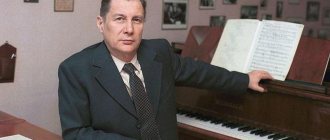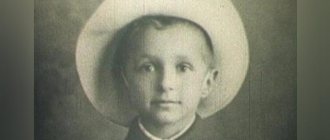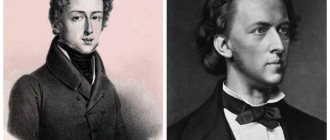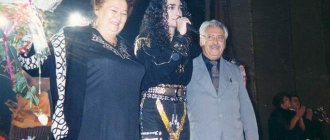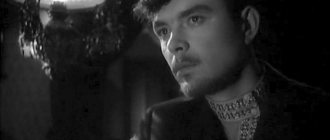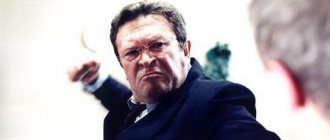Wikipedia has articles about other people with this surname, see Sviridov; Sviridov, Georgy.
| Georgy Sviridov | |
| basic information | |
| Birth name | Georgy Vasilievich Sviridov |
| Date of Birth | December 3 (16), 1915(1915-12-16) |
| Place of Birth |
|
| Date of death | January 6, 1998(1998-01-06) (age 82) |
| A place of death |
|
| Buried |
|
| A country |
|
| Professions | composer, pianist, film composer |
| Tools | piano |
| Genres | symphonic, choral music |
| Awards | |
Georgy Vasilievich Sviridov
(December 3 [16], 1915, Fatezh, Kursk province - January 6, 1998, Moscow) - Soviet Russian composer, pianist, public figure. People's Artist of the USSR (1970). Hero of Socialist Labor (1975). Laureate of the Lenin Prize (1960), the Stalin Prize of the first degree (1946), two State Prizes of the USSR (1968, 1980) and the State Prize of the Russian Federation (1994).
Biography
Georgy Sviridov was born in Fatezh (now in the Kursk region). His father was a postal worker, and his mother was a teacher. Father, Vasily Sviridov, a supporter of the Bolsheviks in the Civil War, died when his son was 4 years old. The composer's distant ancestors were immigrants from the Voronezh province, who moved to the village of Nizhnevygornoye, Timsk district, Kursk province.
In 1924, the family moved to Kursk, where Georgy continued to attend elementary school and where his passion for literature began. Gradually, music began to take first place in his circle of interests[1]. In elementary school, I learned to play my first musical instrument, the balalaika. While learning to play by ear, he demonstrated such talent that he was accepted into the local folk instrument ensemble. From 1929 to 1932 he studied at a music school (now the Children's Art School No. 1 named after G.V. Sviridov) with V. Ufimtseva and M. Krutyansky. On the advice of the latter, in 1932 he moved to Leningrad, where he studied piano with I. Braudo and composition with M. Yudin at the Central Music College (now the St. Petersburg Music College named after M. P. Mussorgsky), from which he graduated in 1936 year[2].
From 1936 to 1941 he studied at the Leningrad Conservatory in the composition class of P. Ryazanov and D. Shostakovich. In 1937 he was admitted to the Union of Composers of the USSR.[3]
Mobilized in 1941, a few days after graduating from the conservatory, he was sent to the Leningrad Military School of Air Surveillance, Warning and Communications (VNOS) (now a branch of the A.F. Mozhaisky Military Space Academy, relocated in August 1941 to Birsk, Bashkir ASSR [4][5], but at the end of the year he was discharged due to health reasons.
Until 1944 he lived in Novosibirsk, where the Leningrad Philharmonic was evacuated[6]. Like other composers, he wrote war songs, of which the most famous was “Song of the Brave” based on poems by A. Surkov. In addition, he wrote music for performances of theaters evacuated to Siberia, including the musical comedy “The Sea Spreads Wide” (1943), staged at the Moscow Chamber Theater located in Barnaul.
In 1944 he returned to Leningrad, and in 1956 he settled in Moscow[7]. He wrote symphonies, concerts, oratorios, cantatas, songs and romances.
Since 1957 - member of the board of the Union of Composers of the USSR, in 1962-1974 - secretary, in 1968-1973 - first secretary of the board of the Union of Composers of the RSFSR. One of the founders of the Petrovsky Academy of Sciences and Arts.
Deputy of the Supreme Soviet of the RSFSR VII, VIII, IX, X, XI convocations.
Sviridov's grave at the Novodevichy cemetery in Moscow.
Under his signature, on September 17, 1958, the Pravda newspaper published an article “Eradicating vulgarity in music,” in which M. Bernes was accused of vulgarity and disdain for vocal technique.
In June 1974, at the Festival of Russian and Soviet Song, held in France, the local press introduced the composer to its sophisticated public as “the most poetic of modern Soviet composers”[8].
In recent years, the composer has been ill a lot. He died on January 6, 1998 in Moscow from a massive heart attack[9]. A civil memorial service and funeral took place on January 9 in Moscow. After the funeral service in the Cathedral of Christ the Savior, he was buried at the Novodevichy cemetery[10].
Family
While still a student, the composer married pianist Valentina Tokareva, and in 1940 their son Sergei was born. The marriage did not last long; already in 1944 he left the family for young Aglaya Kornienko. 4 years later he again became the father of a son, George Jr., immediately after whose birth he moved in with his third wife Elsa Gustavovna Klaser. Outlived both of his sons. Sergei committed suicide at the age of 16, after which the composer had his first heart attack. Son Georgy died on December 30, 1997 from a chronic illness. The composer never found out this tragic news - his wife was going to tell him about it when he got stronger after a recent heart attack. This never happened - a week after the death of his youngest son, on January 6, 1998, he passed away[11].
Personal life
The composer's personal life was not easy. He was married three times. He had two sons, but due to tragic circumstances, George outlived both sons.
The composer never mentioned the passing of the elder Sergei, who was born in marriage with his first wife. Later, after the death of Georgy Vasilyevich, it became known that the boy committed suicide when his parents were at the premiere at the theater. The young man was 16 years old at that time.
Georgy Sviridov with his wife and son | Fenixclub
The youngest son Yuri was seriously ill and had to leave his homeland for treatment. Having lived in Japan for a long time, he died a week before his father's death. Georgy Vasilyevich never found out about this event.
The composer never mentioned his first two marriages in interviews. It is known that Georgy Vasilyevich’s first wife was a pianist, a fellow student of the composer at the technical school. Her name was Valentina Tokareva.
Sviridov's second wife, artist Aglaya Kornienko, was 12 years younger than him. For her sake, Georgy Sviridov left his first family and little four-year-old Seryozha. Married to Aglayushka, as the musician affectionately called her, he had a second son, Yuri.
Georgy Sviridov with his wife Elsa | Academic music news
Fans mostly know his third wife, Elsa Gustavovna Sviridova (Klazer), who was 10 years younger than the composer.
They met at a musical evening at the Philharmonic, at which works by a young talented composer were performed. Elsa Gustavovna wanted to personally express her gratitude to Sviridov, and after the meeting they never parted, so great was the power of the feeling that flared up in the hearts of both.
Creation
The composer wrote his first compositions back in 1935 - a cycle of lyrical romances based on poems by A. S. Pushkin, which became famous.
While he was studying at the Leningrad Conservatory, from 1936 to 1941, he experimented with different genres and different types of composition. He wrote Piano Concerto No. 1 (1936-1939), Symphony No. 1 and a chamber symphony for string instruments (1940).
His style changed significantly in the early stages of his work. The first works were written in the style of classical, romantic music and were similar to the works of the German romantics. Later, many works were written under the influence of his teacher D. Shostakovich, but also, for example, in the First Partita for piano, the composer’s attention to the musical language of P. Hindemith is noticeable.
Starting from the mid-1950s, he acquired his own bright, original style and tried to write works that were exclusively Russian in nature. Of the seasons, Sviridov loved winter most of all, believing that winter is “the time when Russia expresses its nature especially clearly.” The composer musically illustrated the fresh and beautiful northern winters with special inspiration in his works[12].
In 1964, he wrote music for the film “Blizzard” based on the prose of A. Pushkin, which was loved by listeners and was often performed in radio and television programs. In 1974, on the advice of his wife, Elsa Gustavovna, an expert and connoisseur of his work, he made a thorough edition of the score. The work received independent status and became known as “Musical illustrations for the story “The Snowstorm” by A. S. Pushkin.” It gained worldwide fame when performed by a symphony orchestra conducted by V. Fedoseev. Critics pointed out that in the first part of the illustrations Sviridov’s “Troika” is running in winter
, which is felt in music in an “incomprehensible way.” In the same 1964, he was the first composer to write a cantata based on B. Pasternak’s poems “It’s Snowing,” in which, with just two notes, he painted a mesmerizing musical picture of quiet snowfall outside the window. Pictures of Russia lost in history, the lyrical image of its antiquity are recreated by the composer in the fragment “Winter Sings” from the Poem in Memory of S. Yesenin. For “Hymn to the Motherland” I chose the poem by F. Sologub “Where the dormant forests are sad, exhausted by frost...”, dedicated to the Russian North[12].
The choral cycle “Kursk Songs” is directly connected with the native land. This work defined a new direction in Russian music, called the “new folklore wave,” in line with which the “sixties” composers worked - R. Shchedrin, N. Sidelnikov, S. Slonimsky, V. Gavrilin and others.
The composer's music remained little known in the West for a long time, but in Russia his works enjoyed tremendous success among critics and listeners for their simple but subtle lyrical melodies, scale, masterful instrumentation and pronounced national character.
The composer continued and developed the experience of Russian classics, primarily M. Mussorgsky, enriching it with the achievements of the 20th century. He used the traditions of ancient cant, ritual chants, znamenny singing, and at the same time, modern urban mass song. Creativity combines novelty, originality of musical language, precision, exquisite simplicity, deep spirituality and expressiveness.
Author of articles on current issues in musical creativity.
Awards and titles
- Hero of Socialist Labor (1975) - for outstanding services in the development of Soviet musical art and in connection with the sixtieth anniversary of his birth
[13] - People's Artist of the RSFSR (1963)
- People's Artist of the USSR (1970)
- Lenin Prize (1960) - for “Pathetic Oratorio” to the words of V. V. Mayakovsky
- Stalin Prize of the first degree (1946) - for outstanding works in the field of art and literature for 1945 in the field of music (Works of small forms) - for a trio for piano, violin and cello
[14] - USSR State Prize (1968) in the field of literature, art and architecture (in the field of music and concert performance activities) - for “Kursk Songs” for choir and orchestra”
[15] - USSR State Prize (1980) in the field of literature, art and architecture - for the concert for choir “Pushkin’s Wreath”
[16] - State Prize of the Russian Federation (1994) in the field of literature and art (in the field of musical art) - for “Songs and Prayers” for a large mixed choir
[17] - Prize of the President of the Russian Federation (1997) in the field of literature and art[18]
- Order of Merit for the Fatherland, II degree (1995) - for the creation of highly artistic works of national culture and outstanding contribution to world musical art
[19] - Four Orders of Lenin (1965, 1971, 1975, 1985)
- Medal “For Valiant Labor. In commemoration of the 100th anniversary of the birth of Vladimir Ilyich Lenin"
- Medal "For Valiant Labor in the Great Patriotic War of 1941-1945"
- Medal "In memory of the 850th anniversary of Moscow"
- Order of Liberty, 2nd class (Albania, 1954)
- Orders and medals of foreign countries
- Moscow Mayor's Prize in the field of literature and art[20]
- Prize "Golden Disc"
- Honorary Citizen of Kursk (1982)
- Honorary Citizen of Moscow (1997) - in connection with the celebration of the 850th anniversary of the founding of the city of Moscow, for outstanding services to the city and citizens of Moscow
[21] - Honorary Doctor of St. Petersburg State Unitary Enterprise (since 1996)
Life line
December 3, 1915 Date of birth of Georgy Vasilyevich Sviridov. 1924 The Sviridov family moved to Kursk. 1929-1932 Studying at the Kursk Music School. 1932 Move to Leningrad, study at the Central Music College. 1936-1941 Studying at the Leningrad Conservatory. 1935 Creation of the first cycle of romances based on Pushkin’s poems. 1937 Joining the Union of Composers of the USSR. 1950 Sviridov was awarded the Lenin Prize. 1956 Moving to Moscow. 1957 Joining the board of the Union of Composers of the USSR. 1965 Creation of the suite “Time, Forward!” 1968-1973 Work as the first secretary of the board of the Union of Composers of the USSR. 1970 Receiving the title of People's Artist of the USSR. 1980 Secondary receipt of the title of Hero of Socialist Labor. January 6, 1998 Date of death of Georgy Sviridov. January 9, 1998 Funeral of Georgy Sviridov at the Novodevichy cemetery in Moscow.
Works[22][23]
Vocal works (oratorios, cantatas, choirs)
- 6 romances based on words by A. S. Pushkin (1935)
- 7 romances to the words of M. Yu. Lermontov (1938)
- Musical comedy "The Real Groom" (1939)
- 3 romances based on poems by A. A. Blok (1941)
- “Songs of the Wanderer”, vocal cycle for baritone and piano based on poems by Wang Wei, Bo Juyi and He Zhizhang (1941-1942)
- Musical comedy “The Sea Spreads Wide” (1943)
- Vocal cycle “Country of the Fathers” for tenor, bass and piano, poems by A. S. Isaakyan, consists of 11 romances (1950)
- Musical comedy "Ogonki" (1951)
- Oratorio “Decembrists” to the words of A. S. Pushkin and the Decembrist poets (1954-1955, unfinished)
- Romances for voice and piano to poems by R. Burns in translations by S. Ya. Marshak (1955)
- Vocal-symphonic poem “In Memory of S. A. Yesenin” (1956)
- Vocal cycle for tenor, baritone and piano “My father is a peasant” based on verses by S. A. Yesenin (1957)
- 5 choirs for unaccompanied mixed choir (1958)
- "Sloboda Lyrics". Seven songs to lyrics by A. Prokofiev and M. Isakovsky (1958)
- “Pathetic Oratorio” to the words of V. V. Mayakovsky (1959)
- "We don't believe it!" for voice, choir and orchestra to words by V. V. Mayakovsky (1960)
- Vocal cycle (poem) “Petersburg Songs” for four solo singers, piano, violin and cello to poems by A. A. Blok (1961-1963, Spanish 1969)[24]
- “Kursk Songs” for mixed choir and orchestra, folk words (1964
- Small cantata for choir and orchestra “Wooden Rus'” to poems by S. A. Yesenin (1964)
- Small cantata for choir and orchestra “It’s Snowing” based on poems by B. L. Pasternak (1965)
- Small cantata for choir and orchestra “Sad Songs” based on poems by A. A. Blok (1965)
- Romance “These Poor Villages” for voice, piano and oboe, lyrics by F. I. Tyutchev (1965)
- “Spring Cantata” for choir and orchestra, lyrics by N. A. Nekrasov (1972)
- Choral concert “In Memory of A. A. Yurlov” for a mixed choir singing without words (1973)
- Cantata “Ode to Lenin” to words by R. I. Rozhdestvensky for reader, choir and orchestra (1976)
- Departed Rus'. Poem to words by S. A. Yesenin, for baritone and piano (1977)
- Hymns of the Motherland for choir (1978)
- 25 chorales for bass and piano (1939—1979)
- "Pushkin's Wreath" for choir (1979)
- “Night Clouds”, cantata to words by A. A. Blok for mixed choir a cappella (1979)
- 10 romances based on words by A. A. Blok (1972-1980)
- “Ladoga”, poem for choir with lyrics by A. Prokofiev (1980)
- “Songs of Timelessness”, concert for a cappella choir to words by A. A. Blok (1980-1981)
- “Petersburg” to the words of A. A. Blok, vocal poem (1995)
- “Songs and Prayers” (for unaccompanied choir) (1994)[25]
- Vocal cycle “Smolensk Horn” (words by various Soviet poets, different years)
- Music for dramatic performances: “Russian People” by K. M. Simonov (1942, Leningrad Drama Theater named after A. Pushkin, Novosibirsk), “Othello” by W. Shakespeare (1944, ibid.), etc.
Instrumental works
- 7 small pieces for piano (1934-1935)
- Concerto No. 1 for piano and orchestra (1937)
- Chamber Symphony for string orchestra (1940)
- Sonata for violin and piano (1941, rough sketches)
- Concerto No. 2 for piano and orchestra (1942, not fully preserved or not completed)
- Sonata for piano. In memory of I. I. Sollertinsky (1944)
- Quintet for two violins, viola, cello and piano (1944, 2nd edition 1944-1945)
- Trio for violin, cello and piano (1945, 2nd ed. 1955)
- Twelve Pieces for Piano (Partita, 1946)
- Seven Pieces for Piano (Partita in F minor, 1957)
- Album of plays for children. For piano (1957)
- Music for chamber orchestra (orchestral version of the Quintet for piano and strings, 1964)
- "Little triptych" For symphony orchestra (1964)
- Suite “Time, forward!” (1965) music for the film of the same name by M. Schweitzer - the theme of the screensaver of the "Time" program, a USSR news broadcast at 21 o'clock.
- Music for the monument to the fallen on the Kursk Bulge (1973)
- Musical illustrations for A. S. Pushkin’s story “Blizzard” (1974; first published 1978)
- Symphony (year unknown; first performance - 09/23/2016)[26]
Sviridov - the rumor of the era!
Art is not only art.
It is part of the religious (spiritual) consciousness of the people. When art ceases to be this consciousness, it becomes “aesthetic” entertainment. People who are not close to this spiritual consciousness of the people do not understand the essence of art, its sacramental meaning. G.V.Sviridov
The whole country has been listening to the music of Georgy Sviridov every day for several decades. It was his melodies “Time, forward!” was destined to become the harbinger and symbol of every major news story of the last half century. Perhaps this is the insight of fate - in the past century there has not been a composer whose work is so strongly connected with Russia, its ancestral culture and spiritual foundations.
short biography
On December 3, 1915, in the provincial town of Fatezh, Kursk Region, the first child was born into the family of a telegraph employee and a teacher. The parents had peasant roots and could not even imagine that their son, Georgy Vasilyevich Sviridov, would become one of the most famous composers in Russia. A few years later his brother and sister were born. In 1919, the youngest son of the Sviridovs died from the Spanish flu, and then his father died. The family moved to Kursk, where Yura began playing the balalaika, and then the capable child was accepted into the folk instrument orchestra. The music school teachers recommended the young man to continue his education in Leningrad. With their help, in 1932 Yura entered the music college. Afterwards he went to the conservatory, where he was lucky enough to become a student of D.D. Shostakovich. However, Sviridov’s relationship with his great teacher was far from cloudless. He even dropped out of the conservatory in his last year, not returning to classes after the defeat that Shostakovich inflicted on his six songs to the words of A. Prokofiev. Communication between the composers resumed only a few years later.
In the summer of 1941, Sviridov was promoted from musician to soldier, but by the end of that year his poor health did not allow him to continue serving. It is impossible to return to besieged Leningrad, where his mother and sister remained, and until the blockade is lifted he works in Novosibirsk. In 1956, Sviridov moved to the capital. In Moscow, he leads a busy social life, holding leadership positions in the Union of Composers.
While still a student, the composer married pianist Valentina Tokareva, and in 1940 their son Sergei was born. The marriage did not last long; already in 1944, Sviridov left the family for the young Aglaya Kornienko. After 4 years, he again becomes the father of a son, George Jr., immediately after whose birth he moves to his third wife Elsa Gustavovna Klaser. Georgy Vasilyevich outlived both of his sons. Sergei committed suicide at the age of 16, after which Sviridov had his first heart attack. Georgy Georgievich died on December 30, 1997 from a chronic illness. The composer never found out this tragic news - his wife was going to tell him about it when he got stronger after a recent heart attack. This never happened - a week after the death of his youngest son, on January 6, 1998, Sviridov passed away.
Interesting Facts
- The composer has no direct descendants. Elsa Gustavovna died four months after him. The entire creative heritage of Sviridov is handled by his sister’s son, art critic Alexander Belonenko. He created the National Sviridov Foundation and the Sviridov Institute. He published the book “Music as Fate,” compiled on the basis of diaries that the composer kept since the late 60s. In 2002, this publication was declared book of the year. In 2001, the first complete musical directory of Sviridov’s works was compiled, and unpublished musical texts were restored. In 2002, the publication of the Complete Works of G. V. Sviridov in 30 volumes began.
- Sviridov named his eldest son in honor of Sergei Yesenin. The youngest son, Georgiy Georgievich, was a major expert on medieval Japanese prose. In 1991, he was invited to work in Japan. For him, this literally became a salvation - due to chronic renal failure, he needed regular hemodialysis, which was provided free of charge in Japan.
- Vasily Grigorievich Sviridov, the composer’s father, died under tragic circumstances. During the First World War, he was mistakenly hacked to death by Red Army soldiers who mistook the uniform of a postal worker for a White Guard uniform. The younger sister Tamara was born after the death of her father.
- Georgy Vasilyevich was an encyclopedically educated person. His home library consisted of more than 2.5 thousand books - from ancient playwrights to Soviet writers. He was well versed in painting and sculpture. There are eyewitness accounts of him giving a tour of the rooms with Turner's paintings in a London art gallery.
- Both in rehearsal work and in everyday life, Sviridov was harsh and authoritarian; he could not stand unprofessionalism and unprincipled behavior.
- Sviridov was a passionate book lover and fisherman.
- Georgy Vasilyevich, unlike many of his contemporaries, was not a wealthy person. For example, he did not have his own dacha, living on a state-owned property, and rented the piano that was in his home from the Union of Composers.
- At the end of his life, the composer regretted that he did not write an opera, because he mistakenly believed that this genre had exhausted itself. However, two of Sviridov’s operettas, “The Sea Spreads Wide” and “Little Lights,” were very popular.
- The crisis of 1948, which followed the Politburo resolution on the opera “The Great Friendship” by V. Muradeli, also affected Sviridov, although his name did not appear in the resolution. His teacher, D.D., was declared the main formalist. Shostakovich, whose students also fell into disgrace, accompanied by an information vacuum, lack of orders for works and the opportunity to perform them. It was a time when a lot of things were written on the table.
- One of the composer’s most successful and significant works, “Pathetic Oratorio,” separated Sviridov and Shostakovich. Dmitry Dmitrievich did not like Mayakovsky, and in the presence of other musicians he criticized the idea of a work based on his poems. Most of the composer community supported Shostakovich's opinion. Attempts were made to block the awarding of the Lenin Prize to the sonata. However, the work was highly appreciated by the prize commission and M. Suslov personally, thanks to which the composer nevertheless became a Lenin laureate. But this correspondence confrontation, as well as subsequent creative differences, cooled the relationship between the composers for many years. Nevertheless, shortly before his death, Sviridov admitted that of all the music of the 20th century, he sincerely loved only the music of Shostakovich.
- In the early 60s, Sviridov wrote a new version of the USSR anthem based on poems by A. Tvardovsky. It was never made public and was preserved only in the composer's personal archive.
- Of all the composers, Sviridov ranked Mussorgsky and Borodin above the rest for their unconditional adherence to the canons of the Russian folk and spiritual musical tradition. He considered Khovanshchina the greatest work of Russian art.
- A few months before his death, the composer became an honorary citizen of Moscow.
- The world's only monument to G.V. was erected in Kursk. Sviridov. Since 2005, his memorial museum has been created in the Fatezh house where the composer was born.
Years of creativity
Unlike his teacher and idol, D.D. Shostakovich, Georgy Vasilyevich was by no means a “child prodigy.” His first compositions date back to 1934-1935 - these are pieces for piano and romances based on poems by A.S. Pushkin. The great poet will be destined to become a companion of the composer's work for many years. It is the music for Pushkin’s “The Snowstorm” that will become the most famous of his works. It would also become his “trap” - no later works were performed as often, and it was the one that his listeners preferred.
For a composer professing classical musical forms, the choice of the main creative direction was also unconventional - vocal music, song, romance. Although sonatas were written, and a Piano Trio, awarded the Stalin Prize, and music for dramatic performances, and even a single symphony. But it was Pushkin’s romances that changed the life of the 19-year-old aspiring composer. Sviridov wrote them both in the noisy dormitory of the music college and in his home, sick and hungry in St. Petersburg, strengthened and caressed by maternal warmth in Kursk. The romances were immediately published, and in the year of the centenary of the poet’s death, they were performed by many outstanding singers.
The composer was inspired by poets of the first magnitude - Lermontov, Tyutchev, Pasternak, R. Burns, Shakespeare. He set Mayakovsky's style and even Gogol's prose to music. Perhaps the most beloved and closest to him were Sergei Yesenin and Alexander Blok. Starting with the vocal cycle “My Father is a Peasant” and the vocal-symphonic poem “In Memory of S. A. Yesenin,” written in 1956, Sviridov constantly uses Yesenin’s poems to create his works. Almost as often, he turns to the poetry of Blok, whom he considered the prophet of his country. Among the works: “Voice from the Choir”, the cycle “Petersburg Songs”, the cantata “Night Clouds” and the last large-scale work, the creation of which took 20 years - the vocal poem “Petersburg”. The composer finished this work, knowing that he would entrust its first performance to the young baritone D. Hvorostovsky. The premiere took place in London in 1995. In 1996-2004, the singer released two discs of Sviridov’s works. For many years, E. Obraztsova was Sviridov’s muse, with whom several romance concerts were performed, where the composer personally accompanied the singer, and records were recorded.
A notable direction of Sviridov's creativity was choral music. These are “Five Choirs to the Words of Russian Poets”, and the cantata “Kursk Songs” based on folklore sources, awarded the State Prize, and the famous “Pushkin Wreath”. The author designated the genre of this work as a choral concert. A wreath is one of the symbols of life itself with its cycle of seasons, the cyclicity of birth and death. It intertwines thoughts and feelings, external and internal. From the poet’s creative heritage, Sviridov chose 10 poems - written at different times, from 1814 to 1836, different in themes, mood, famous and almost forgotten. Each part of the concert, trying to correspond to the poetic fundamental principle, has its own sound. The author does not limit himself to the choir; he introduces instrumental accompaniment, bell ringing, and uses the sound of a second chamber choir.
In 1958-1959, Sviridov created the seven-part “Pathetic Oratorio” based on poems by V. Mayakovsky. This work became a symbol of a new stage in the composer’s life. The oratorio was unusual in many ways - its literary source (after all, Mayakovsky’s poetry was considered anti-musical), the expanded composition of the orchestra and choir, and its bold musical form. The work was awarded the Lenin Prize.
With rare exceptions, such as the cantata “Ode to Lenin” to the words of R. Rozhdestvensky, Sviridov did not betray his calling - to glorify Russia, its people, nature, culture, spirituality. One of the master’s last works was the choral composition “Songs and Prayers,” written on the themes of the psalms of David.
Sviridov's music in cinema
Since 1940, Georgy Vasilyevich worked for cinema 12 times. The music for the two films surpassed the glory of the films themselves. In 1964, Vladimir Basov filmed “The Snowstorm” based on Pushkin’s story of the same name and invited Sviridov to write the music. Lyrical melodies were born that perfectly reflect the patriarchal life of the province of Pushkin’s era. In 1973, the composer compiled “Musical illustrations for the story by A.S. Pushkin "Blizzard". A year later, the film “Time, Forward!” was released. about the builders of Magnitogorsk. The leading roles were played by the best actors of their time. Sviridov's music vividly expressed the enthusiasm and emotional upsurge of Soviet youth.
Among the composer’s other film works: “Rimsky-Korsakov” (1952), “Resurrection” (1961), “Red Bells. Film 2. I saw the birth of a new world" (1982). In 1981, the operetta “Ogonki” was filmed (the film “It Was Behind the Narva Gate”).
Sviridov's music is rarely used in film soundtracks. Some of the few include: “Lorenzo’s Oil” (1992), “Dead Man Walking” (1995), “Tanner Hall” (2009).
Sviridov chose song as his main form of creativity. He drew inspiration from how people lived, believing that art should be simple and understandable. Being a religious man, he remembered that in the beginning there was the word. It was the word that the composer valued above all else. That's why he devoted his life to combining words and music. Today, two decades after the creator’s departure, his music still lives on – popular, relevant and in demand by listeners.
Filmography
Georgy Sviridov is the author of music for films[27]. In addition, the composer was part of the film crew of “The Golden Calf” for some time: he created three orchestral fragments (“Avtoprobeg”, “Ostap Bender” and “Panikovsky”), after which the collaboration of the composer and M. Schweitzer was interrupted for some reason, and the director turned to G. Firtich, who is listed in the credits as the author of the music. However, according to the research of candidate of art history A. Belonenko[28], the film also features music by G. Sviridov: the theme of the motor rally belongs to him.
- 1939 — Virgin Soil Upturned
- 1940 - We are not more fun
- 1940 - Ordinary Business (short film)
- 1951 - Przhevalsky
- 1952 - Rimsky-Korsakov
- 1953 - Great warrior of Albania Skanderbeg
- 1956 - Polyushko-field
- 1957 - Don Cesar de Bazan (film-play)
- 1960 - Resurrection
- 1964 - Russian Forest
- 1964 - Blizzard
- 1965 - Time, forward!
- 1968 — Lights (film-play)
- 1970s - Pathetic Oratorio (film-play)
- 1975 - Trust
- 1981 - It was behind the Narva outpost
- 1981 - Tsar Fyodor Ioannovich (film-play of the Maly Theater)
- 1982 - Red Bells. Film 2. I saw the birth of a new world
- 1983 - Years of my spring (documentary)
- 1983 — Snowstorm (film-play)
- 1994 - Tsar Boris (film-play)
- 1998 - Tsar Ivan the Terrible (film-play)
- 2006 - Poet Nikolai Rubtsov (documentary) (music used)
- 2009 - Tsar Ivan the Terrible (film-play)
Participation in films
- 1960 - Inspirational art (documentary)
- 1973 - Composer Sviridov (documentary)
- 1996 - Time of Sviridov (documentary)
Archive footage
- 2009 - Blue sea...white ship...Valeria Gavrilin (documentary)
Memory
Monument to Georgy Sviridov in Kursk
- On September 23, 2005, the first monument to the composer was unveiled in Kursk, on which his words are carved: “Sing of Rus', where the Lord gave and ordered me to live, rejoice and suffer”[29][30].
- In the composer's hometown Fatezhe, a memorial house-museum of the composer was opened on December 16, 2005.[31][32]
- The public movement “Orthodox Russia” established a commemorative medal “Our Heritage” named after Georgy Vasilyevich Sviridov to reward achievements in the field of musical art, creative activity aimed at supporting and developing national culture.
- Astronomer of the Crimean Astrophysical Observatory L.G. Karachkina named asteroid N 4075, discovered on October 14, 1982, in honor of G.V. Sviridov 4075 Sviridov[33]. Asteroid N 5093, discovered on the same night, was named by her 5093 Svirelia in honor of the wife of the composer Elsa Gustavovna Sviridova-Klaser (1925-1998)[34].
- The name “Georgy Sviridov” is borne by Aeroflot’s Airbus A320 (w/n VP-BDK)[35].
- Since 2001, the All-Russian Vocal Music Competition named after G.V. Sviridov has been held in Kursk once every three years.
- Since 2005, the International Competition for Youth Performing Arts named after G.V. Sviridov has been held every two years. Representatives of age categories from 10 to 21 years participate in the competition. Competition nominations for soloists and ensembles: piano, violin, cello, piano duet, chamber ensemble with piano (duets, trios, quartets, quintets).[36]
- In 2005, in St. Petersburg, on the territory of the Humanitarian University of Trade Unions, on the Alley of Honorary Doctors, a bronze bust of the composer was unveiled. Sculptor A. Charkin.
- Memorial plaques have been unveiled on the houses where the composer lived in Moscow and Kursk
- The National Sviridov Foundation and the Sviridov Institute are headed by the son of the composer’s sister, candidate of art history, Honored Artist of Russia Alexander Sergeevich Belonenko.[37]
Music schools
- The Moscow children's music school in the northeast of the capital was named after the composer in 1999.[38]
- In Yekaterinburg, children's art school No. 14 has been named after G. V. Sviridov since 2011.[39]
- A children's art school in the Vyborg district of St. Petersburg was named after the composer in 1999.[40]
- In Balashikha, near Moscow, art school No. 1 was named after the composer in 1999.[41].
- In Togliatti, the Children's Art School was named after G. V. Sviridov in 2006.[42]
- In Petrozavodsk, children's music school No. 3 has been named after the composer since 2001.[43]
- Berd children's music school was named after G. V. Sviridov in 2010.[44]
- In Kursk in 1998, a music school was named after him (now the Children's Art School No. 1 named after G.V. Sviridov), where the composer studied.[45]
- The Serov children's music school has been named after G. V. Sviridov since 2002.[46]
- Children's music school No. 1 in the city of Kropotkin is named after the composer.[47]
- Children's Art School No. 6 of Rostov-on-Don was named after G. V. Sviridov in 2002.[48]
- On July 26, 2006, the Children's Art School No. 3 of Bryansk was named after the composer.[49]
- The Gubkin Children's Art School (Yamalo-Nenets Autonomous Okrug) received the name of G. V. Sviridov in April 2014[50]
- The Nikolaev Children's Music School (Volgograd Region) was named after the composer in December 2005.[51]
In 2002, the Association of Children's Art Schools and Children's Music Schools named after the composer was created. The Association includes 13 schools at the end of 2020.[52][53]
Memory of Sviridov
Music schools
- In Moscow, several children's music schools bear his name.
- In Yekaterinburg, children's art school No. 14 is named after Sviridov [28]
- An art school named after him was opened in St. Petersburg on Yesenin Street.
- In Balashikha near Moscow, art school No. 1 was named after the composer [29].
- Since 1995, the MBU DO School of Arts has been operating in Tolyatti, which in 2006 was named after G.V. Sviridov.
- In the city of Petrozavodsk (the capital of the Republic of Karelia), children's music school No. 3 bears the name of the composer.
- Berd children's music school named after G.V. Sviridov.
- In Kursk, the music school where Georgy Vasilevich Sviridov studied was named after him.
- Serov Children's Music School named after. G. V. Sviridova
In quotations
They ask me: what am I? I am Russian person! And that's the end of it. What more can be said? I'm not Russian. Because a Papuan can also be a Russian. And he can live perfectly well in Russia. To his health, let him live. But a Russian person is a Russian person. Russian blood flows in me. I don't think I'm better than others, more wonderful. But here I am as I am - a Russian person. And I'm proud of it. I urge you from the height of my age (and don’t be angry with me for saying this): we must be proud that we are Russian people!
— Georgy Vasilievich Sviridov. February 4, 1997[54]
There is such a somewhat painful passion - to compare famous people with something huge - with the Himalayas, with the Pacific Ocean, with the Barabinsk steppe. And even if these walking Himalayas are in fact no taller than a woodpile, and the entire steppe is a half-hour ride on gophers, the delusion of exaltation remains. I want to compare Sviridov with something very simple and amazing. Let me have it - not an ocean into which rivers with big names flow. Let it be a forest stream, fed by unknown underground springs. And if some tired traveler, a random passer-by comes across it, the stream will bring unexpected joy to the thirsty person and fill him with moisture that he will not drink in any other place... I don’t know if this has global significance...
— Valery Gavrilin[55]
Height, weight, age. How old is Alena Sviridova
Despite the fact that Alena has been singing for about thirty years, she still has no plans to end her career. Once, in an interview, the singer decided to admit that she really liked performing on stage. And indeed, if you look at photos of Alena Sviridova in her youth and now, all this time the woman really looks happy. And besides, it’s unlikely that a large army of fans would have allowed her to leave so easily.
Newly arriving fans are often interested in what the artist’s height, weight, and age are. How old is Alena Sviridova is easy to answer, because this information is publicly available. The woman is already 56, but she is still full of energy. With a height of 175 centimeters, she weighs 57 kilograms, and thus can give odds to any young girl.
Notes
- Kursk The pride of the Kursk land. G. V. SVIRIDOV
- Sviridov G.V. / Sokhor A.N. // Okunev - Simovich. - M.: Soviet Encyclopedia: Soviet Composer, 1978. - (Encyclopedias. Dictionaries. Reference books: Musical Encyclopedia: [in 6 volumes] / chief editor Yu. V. Keldysh; 1973-1982, vol. 4).
- Georgy Sviridov (undefined)
. 24SMI. Retrieved December 7, 2020. - Kurganovskaya O.
Quiet pier of Georgy Sviridov
(unspecified)
.
"Origins".
Information and journalistic weekly
(December 9, 2009). Retrieved December 26, 2020. - School - PVKURE 1972-1976, 10th battery
- Official website of the city of Novosibirsk. History 1941-1945
- Vainkop Yu. Ya., Gusin I. L.
S // Brief biographical dictionary of composers / Ed. I. V. Golubovsky. — 2nd ed., add. - L.: Music, 1971. - P. 140. - 208 p. - Eskom Newspaper - VERA 10
- Sviridov in the House of Blackheads
- Church of the Holy Trinity in Khokhly
- https://soundtimes.ru/muzykalnaya-shkatulka/velikie-kompozitory/georgij-sviridov
- ↑ 1 2 Alexey Vulfov.
Sviridov snowstorm
(unspecified)
. Gudok (December 28, 2015). Retrieved March 19, 2020. - Decree of the Presidium of the Supreme Soviet of the USSR dated December 18, 1975 No. 2686-IX “On assigning the composer G.V. Sviridov. title of Hero of Socialist Labor"
- Resolution of the USSR Council of Ministers of June 26, 1946 No. 1413 “On the award of Stalin Prizes for outstanding works in the field of art and literature for 1945”
- Resolution of the CPSU Central Committee, Council of Ministers of the USSR dated November 5, 1968 No. 859 “On the award of USSR State Prizes in the field of literature, art and architecture in 1968”
- Resolution of the CPSU Central Committee, Council of Ministers of the USSR dated October 31, 1980 No. 975 “On the award of 1980 USSR State Prizes in the field of literature, art and architecture”
- Decree of the President of the Russian Federation of May 29, 1995 No. 537 “On awarding State Prizes of the Russian Federation in the field of literature and art of 1994”
- Decree of the President of the Russian Federation of December 15, 1997 No. 1281 “On awarding the 1997 Presidential Prizes of the Russian Federation in the field of literature and art”
- Decree of the President of the Russian Federation of December 10, 1995 No. 1243 “On awarding the Order of Merit to the Fatherland, II degree, to G. V. Sviridova.
- On September 5, the ceremony of presenting Moscow city awards in the field of literature and art took place.
- Resolution of the Moscow City Duma of September 3, 1997 No. 57 “On conferring the title “Honorary Citizen of the City of Moscow”
- List of main works by G. V. Sviridov | Musical encyclopedia (Russian) (undefined)
. Retrieved December 9, 2020. - Georgy Vasilievich Sviridov | Classic-music.ru (undefined)
. www.classic-music.ru. Retrieved December 9, 2020. - Sviridov. “St. Petersburg Songs” | Belcanto.ru (unspecified)
. www.belcanto.ru. Retrieved December 9, 2020. - “Chants and Prayers” by Georgy Sviridov were performed at the Moscow Conservatory
- (unspecified)
will take place in Irkutsk . Interfax (September 23, 2016). Retrieved September 23, 2016. - Georgy Sviridov: Complete list of works (notographic reference book). - M.-SPb., 2001. - P. 119-124.
- Georgy Sviridov: Complete list of works (notographic reference book). - M.-SPb., 2001. - P. 123.
- On December 16, Georgy Sviridov would have turned 90 years old
- (unspecified)
was unveiled in Kursk . REGNUM (September 23, 2005). Retrieved August 14, 2010. Archived June 2, 2012. - Memorial Museum of Composer G.V. Sviridova | Kursk Museum of Local Lore (Russian) (undefined)
. Retrieved December 7, 2020. - House-Museum of G.V. Sviridova / National tourism (undefined)
. www.russia-open.com. Retrieved December 7, 2020. - MPC Small Solar System Database (4075)
- MPC Small Solar System Database (5093)
- VP-BDK (cn 2106) "G.SVIRIDOV".
- VIII International Competition for Youth Performing Arts named after G.V. Sviridova. Saint Petersburg. (undefined)
. www.music-competitions.ru. Retrieved December 7, 2020. - Personal page (undefined)
. history.spbu.ru. Retrieved December 7, 2020. - GBUDO Moscow "Children's Music School named after G.V. Sviridov": Home (undefined)
. sviridov.music.mos.ru. Retrieved December 7, 2020. - Official website of EDSHI No. 14 named after G.V. Sviridov (unspecified)
. - » HistorySchool named after. G.V. Sviridova (Russian). Retrieved December 9, 2020.
- Children's Art School No. 1 named after G. V. Sviridov
- MBU DO SHI named after G.V. Sviridova (undefined)
. sviridov-dshi.smr.muzkult.ru. Retrieved December 7, 2018. - History of the school - Children's music school named after G.V. Sviridova (Russian). Retrieved December 7, 2020.
- Home — MBUDO “Berdsk Children's Music School named after. G.V.Sviridova" (Russian). Retrieved December 7, 2020.
- Children's Art School No. 1 named after. G.V. Sviridov of the city of Kursk | History of the school (undefined)
. svdshi.kursk.muzkult.ru. Retrieved December 7, 2020. - Serov Children's Music School named after. G. Sviridova (undefined)
. - Children's music school No. 1 named after G.V. Sviridov | Home (undefined)
. krop-dmh1.krd.muzkult.ru. Retrieved December 7, 2020. - About the school | Children's Art School No. 6 named after G.V. Sviridov (unspecified)
. Retrieved December 7, 2020. - Children's Art School No. 3, Bryansk (unspecified)
. musschool3.ru. Retrieved December 7, 2020. - Information about the educational organization (unspecified)
. gdshi.ru. Retrieved December 7, 2020. - Children's music school named after G.V. Sviridova | About the school (undefined)
. sviridov-dmsh.vgr.muzkult.ru. Retrieved December 7, 2018. - Association of children's art schools and children's music schools named after G.V. Sviridova | Home (undefined)
. adshi.kursk.muzkult.ru. Retrieved December 7, 2020. - Association of Schools named after G. Sviridov - Children's Music School named after G.V. Sviridova (Russian). Retrieved December 7, 2020.
- Georgy SVIRIDOV: “Don’t be ashamed that we are Russian people.” “SOVIET RUSSIA” N 162 (12773), Thursday, December 15, 2005
- Valery Gavrilin. "My Sviridov."
Literature
- Sokhor A. N.
Georgy Vasilievich Sviridov. - L.: State. music publishing house - 1956. - 157 p. - Sokhor A. N.
Georgy Sviridov. - M., 1960. - 2nd ed. - M.: Soviet Composer, 1972. - 345 p.
“Kursk Songs” by G. Sviridov. - M.: Soviet Composer, 1970. - 68 p.
